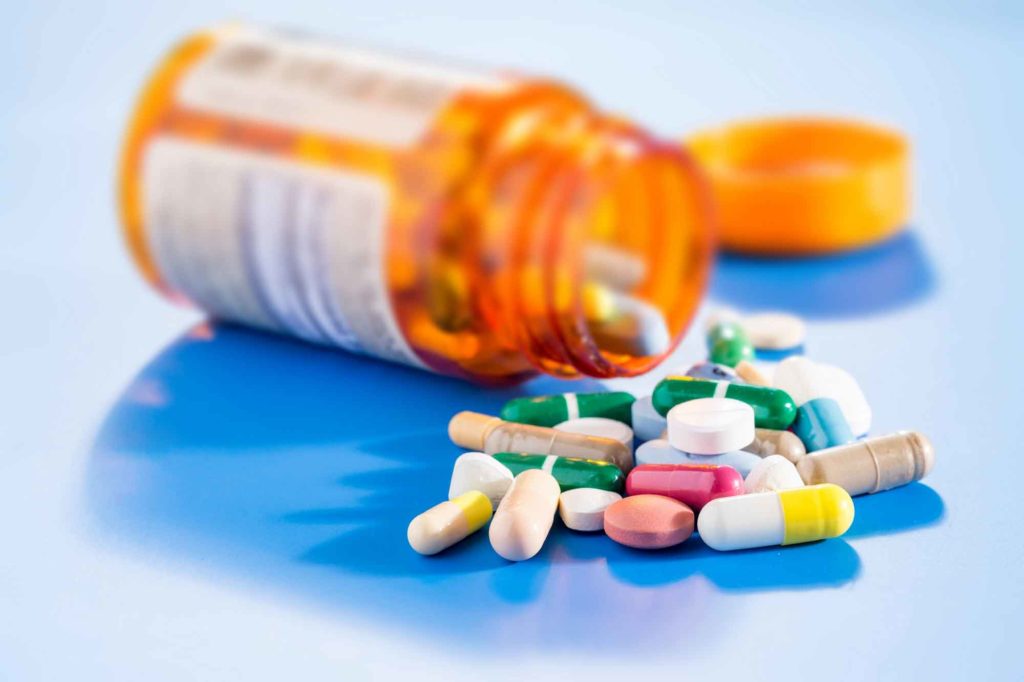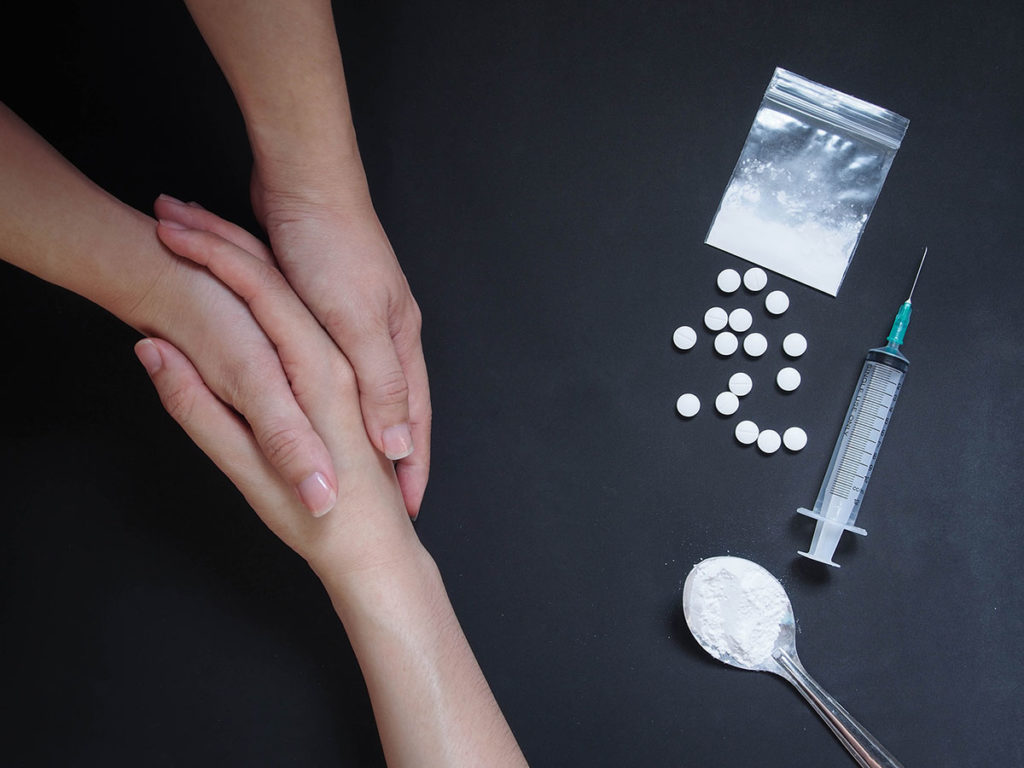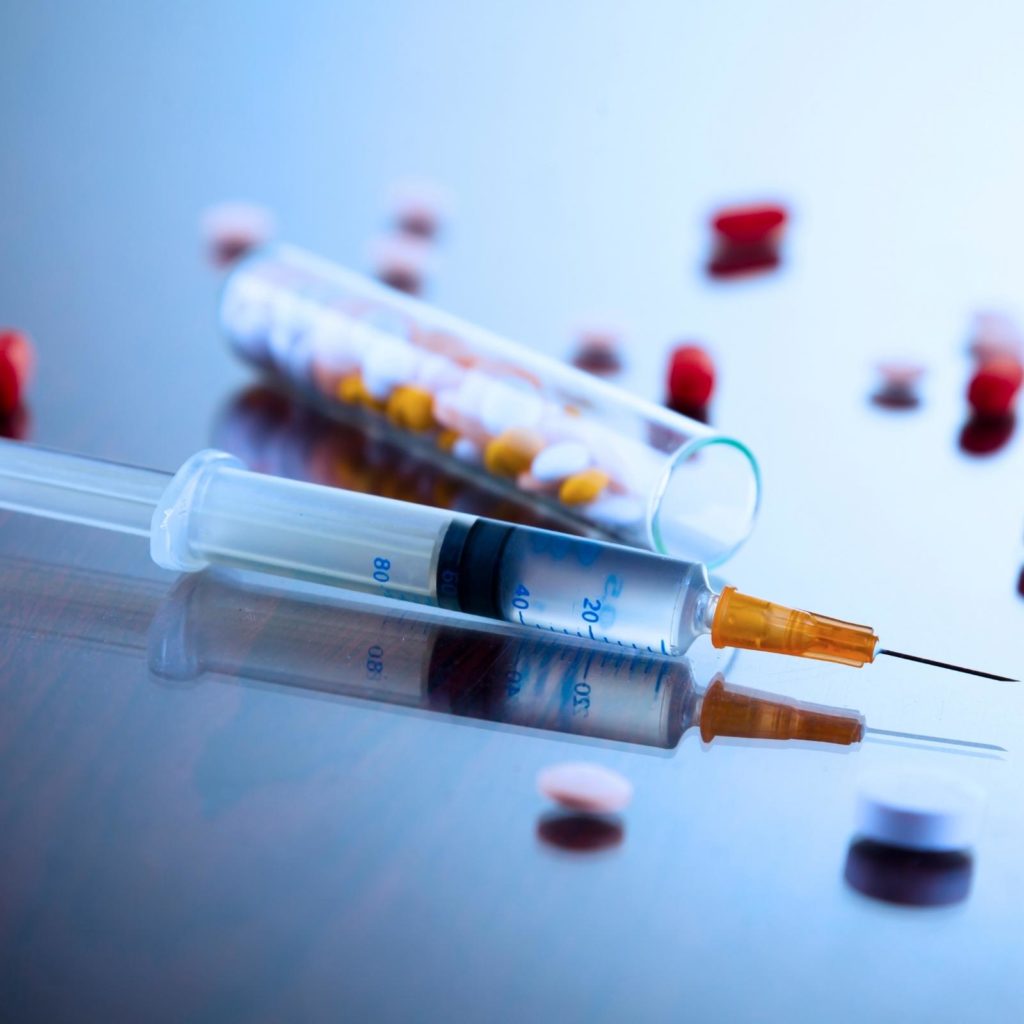What is Oxycodone?
Oxycodone is a common opioid pain killer sold under the brand name OxyContin, among others. However, Oxycodone can cause physical dependence and addiction. It is a narcotic prescribed for moderate to severe pain and is sometimes formulated in combination with acetaminophen (Percocet) or aspirin (Percodan). The extremely addictive nature of oxycodone and other opioids has created an opioid crisis across the US. In 2019, nearly 50,000 people in the United States died from opioid overdoses [1].
The CDC currently estimates more than 1000 emergency department visits daily related to the misuse of opioids and about 91 opioid overdose deaths every day. Oxycodone, like all narcotics (e.g., morphine, powder heroin, black tar heroin, fentanyl, and all prescription opioid pain relievers) has an acutely high addiction profile. These drugs have psychoactive effects if more than a medically necessary amount is used.
Oxycodone is abused orally or intravenously. The tablets are crushed and sniffed or dissolved in water and injected. Can you smoke oxycodone? Yes, others heat a tablet that has been placed on a piece of foil and then inhale the vapors. Oxycodone products are in Schedule II of the Controlled Substances Act, meaning they have medical use and a high potential for Oxycodone addiction [2].

Euphoria and feelings of relaxation are the most common effects of oxycodone on the brain, which explains its high potential for abuse. Individuals who abuse these drugs crush them up into powder form and snort through the nose. This mode of administration is also referred to as nasal insufflation. Snorting oxycodone fast tracks the effects of the narcotic on the central nervous system (CNS), which results in the strong effect that users seek. Moreover, people can mix alcohol and Oxycodone to intensify the effects of the drug.
Signs of Oxycodone Use, Abuse, & Addiction
People use oxycodone to manage pain, but the prescription drug can also cause feelings of a “high” or euphoria that can possibly lead to repeated nonmedical abuse of oxycodone. Tolerance may also build with repeated use of opioid drugs like oxycodone, which itself can lead to escalating patterns of use. Tolerance means that the body adapts to the presence of the drug, with the result being they need increasing amounts of oxycodone to feel the desired or pleasurable effects.
Roughly a quarter of people who are prescribed oxycodone or other opioids for pain management are estimated to abuse these medications. Abuse of prescription drugs like oxycodone can increase the risk of addiction and life-threatening overdose symptoms. While many individuals take oxycodone as prescribed, widespread misuse and diversion of these prescription drugs have made oxycodone addiction more prevalent.

Get Your Life Back
Find Hope & Recovery. Get Safe Comfortable Detox, Addiction Rehab & Dual Diagnosis High-Quality Care.
Hotline(844) 597-1011Possible Signs of Oxycodone Addiction
As oxycodone addiction becomes increasingly problematic, certain characteristic symptoms, signs, and behavioral changes may occur in the individual that could reveal that an opioid use disorder has developed. Some potential signs of oxycodone addiction include:
- Taking more oxycodone than was originally prescribed.
- Cravings to use oxycodone.
- Attempts to stop using, or cut back on using, are unsuccessful.
- Using a good deal of time and resources to get oxycodone, use it, and recover from using the drug.
- Not being able to complete expected duties at work, school, or home.
- Continues to use this drug despite the consequences of its use.
- Giving up interests or hobbies that were once enjoyed due to oxycodone use.
- Using oxycodone in high-risk situations, such as driving or swimming.
- Continuing to use oxycodone, even knowing that it worsens a medical or psychological problem.
- Developing a tolerance to oxycodone and taking more of it to get the same effects as before.
- Showing signs of withdrawal when oxycodone is withheld, including nausea, diarrhea, sweating, or body aches.

Long Term Use of Oxycodone
Oxycodone is a prescription painkiller in the opioid family. While it can be effective at addressing and reducing pain, this medication has been shown to have a high risk of abuse due to the euphoric feeling it produces. Therefore, it should be used only as directed by a physician.
Oxycodone works by interacting with opioid receptors in the brain to suppress the transmission of nerve signals, such as those that cause pain. It also stimulates the release of endorphins, which are brain chemicals that cause pleasurable sensations. Some users begin to crave that high, in addition to receiving pain relief, which is one of the ways oxycodone can easily lead to dependence.
Prescription opioids such as oxycodone are associated with certain harmful health effects, including:
- Drowsiness
- Confusion
- Nausea
- Slowed breathing
Oxycodone addiction can increase the risk of these and other adverse effects. As misuse persists, more chronic issues may arise including:
- Cumulatively high risk of overdose
- Sexual dysfunction in men
- Hypoxic brain injury as a result of respiratory arrest
- Chronic constipation
- Menstrual irregularities in women
Get Help. Get Better. Get Your Life Back.
Searching for Accredited Drug and Alcohol Rehab Centers Near You?
Even if you have failed previously and relapsed, or are in the middle of a difficult crisis, we stand ready to support you. Our trusted behavioral health specialists will not give up on you. When you feel ready or just want someone to speak to about therapy alternatives to change your life call us. Even if we cannot assist you, we will lead you to wherever you can get support. There is no obligation. Call our hotline today.
(844) 597-1011Can You Shoot Oxycodone?
Can you inject oxycodone? Yes, you can. Generally, when people want to shoot up oxycodone, they will crush and dissolve the tablets in water, creating a solution that can be intravenously injected. Some people learn how to shoot oxycodone because it provides them with a faster effect. When any drug is injected, and this includes shooing up oxycodone, it reaches the brain more quickly and the high people feel may also be more powerful.
However, oxycodone doesn’t necessarily provide the strong rush that other drugs do when it’s injected. Moreover, the extended-release version of oxycodone is prescribed now in a tamper-proof form. It means it turns into a gel when they try to crush it. That makes extended-release oxycodone impossible to snort, but it doesn’t always derail people who want to inject it.
What Are the Risks of Shooting Oxycodone?
If someone is injecting oxycodone, there are many risks that wouldn’t be present even when just taking the drug orally. If you’re injecting oxycodone in an extended-release form, the effects of all of the drugs are hitting your body at once, leaving you at a much greater risk of an overdose. It’s very possible if you’re injecting extended-release oxycodone that you will suffer from respiratory depression and possible overdose or die. Other health risks include:
Skin Infections
Using non-sterilized needles or neglecting to sterilize the skin before shooting Oxycodone can expose the body to dangerous bacterial infections, leading to serious skin infections, cellulitis, abscesses, and other skin conditions.
Cardiovascular Infections
Drug use using non-sterile needles or skin can also introduce bacteria to the bloodstream. This can lead to infections of several organs including the endocardium (the interior lining of your heart), heart valves, and lungs.
Infectious Disease Transmission
Sharing needles is a common vector for certain serious infections including HIV and Hepatitis C.HIV, or human immunodeficiency virus, is a virus that attacks immune cells, and cells that help the body fight off other infections. Hepatitis C is a virus that causes damage to the liver, damage that can become serious over time. Chronic Hepatitis C infection can be cured with specialty medications taken daily for two to six months.
First-class Facilities & Amenities
World-class High-Quality Addiction & Mental Health Rehabilitation Treatment
Rehab Centers TourRenowned Addiction Centers. Serene Private Facilities. Inpatient rehab programs vary.
Addiction Helpline(844) 597-1011Proven recovery success experience, backed by a Team w/ History of:
15+
Years of Unified Experience
100s
5-Star Reviews Across Our Centers
10K
Recovery Success Stories Across Our Network
- Low Patient to Therapist Ratio
- Onsite Medical Detox Center
- Comprehensive Dual-Diagnosis Treatment
- Complimentary Family & Alumni Programs
- Coaching, Recovery & Personal Development Events

Why Do People Inject OxyContin/Oxycodone?
Even though the extended-release formulation of OxyContin is tamper-proof, some people still inject it and other oxycodone-containing substances. While the majority of drug users begin using drugs by swallowing, smoking, or snorting them, these methods of administration take a few minutes to an hour to produce effects. This means drug users have to wait some length of time before they get high.
The study also found that even among people in treatment for drug dependence, there seems to be little appetite for moving to stronger prescription narcotics such as fentanyl or various derivatives of morphine.
People struggling with addiction will crush OxyContin pills and inject or snort them to get high, but they don’t seem to want to take more potent prescription drugs. Those drugs — such as fentanyl, hydromorphone, and Dilaudid — have a pretty small safety margin. When you look at the dose to produce euphoria versus the amount required for overdose, it’s a pretty small difference. So even serious drug abusers said they try to avoid those drugs.
How Fast Can You Get Addicted to Oxycodone?
People who develop an addiction to prescription painkillers increase their risk of becoming heroin addicts. More than 80% of persons who have been addicted to heroin report misusing opiate prescriptions earlier in life. Some people can use Oxycodone as prescribed for weeks and not develop a physical dependence or an addiction.
Other people report feeling symptoms of withdrawal and addiction after only a week. There is no definitive answer. It could take weeks, months, or years to develop an addiction. However, developing tolerance and physical dependence on oxycodone is a different matter.
World-class, Accredited, 5-Star Reviewed, Effective Addiction & Mental Health Programs. Complete Behavioral Health Inpatient Rehab, Detox plus Co-occuring Disorders Therapy.
CALL(844) 597-1011End the Addiction Pain. End the Emotional Rollercoaster. Get Your Life Back. Start Drug, Alcohol & Dual Diagnosis Mental Health Treatment Now. Get Free No-obligation Guidance by Substance Abuse Specialists Who Understand Addiction & Mental Health Recovery & Know How to Help.
Oxycodone Addiction Treatment
First and foremost, if you think that a loved one shows signs of addiction to oxycodone, like the counterfeit yellow Percocet, you should first research the drug and addiction associated with it so that you can better understand what your loved one needs. This begs the question, “can you shoot Oxycodone?” Based on the above article, yes, but not without risk. You must plan an intervention to provide your loved ones with options to battle their addiction in a safe and supportive environment. During this intervention, make sure that you offer compassion and support instead of judgment. Lastly, offer your support throughout the entire treatment process.
In addition, prolonged Oxycodone addiction can have severe physical and psychological effects, so it is essential to seek treatment as soon as possible. Inpatient drug rehab offers intensive care that can help you get through the early stages of withdrawal promptly.

Medically-Assisted Detox
Medical detox is often considered the first stage of treatment. It will help you navigate the complicated process of withdrawal, but it doesn’t address patterns of thought and behavior that contribute to drug use. Various treatment approaches and settings can help provide the ongoing support necessary to maintain long-term sobriety after you complete detox.
Cravings are very common during detox and can be challenging to overcome. This often leads to relapse. Constant medical care provided during inpatient drug rehab helps prevent relapse. Clinicians can provide necessary medication and medical expertise to lessen cravings and the effects of withdrawals.
Psychotherapy
Several different modalities of psychotherapy have been used in the treatment of mental health disorders along with addiction, including:
- Cognitive Behavioral Therapy (CBT) – is an effective treatment that involves making changes in both the patterns of negative thoughts and the behavioral routines which are affecting the daily life of the depressed person for various forms of depression.
- Dialectical Behavioral Therapy – is a comprehensive mental health and substance abuse treatment program whose ultimate goal is to aid patients in their efforts to build a life worth living. The main goal of DBT is to help a person develop what is referred to as a “clear mind.”
- Person-Centered Therapy – is a strategy that allows and encourages clients to understand and resolve their concerns in a safe, supportive environment.
- Solution Focused Therapy – is an approach interested in solutions that can be quickly implemented with a simple first step leading to further positive consequences.
Dual Diagnosis Treatment
Drug abuse and mental health disorders often co-occur. In many cases, traumatic experiences can result in a mental health disorder and substance abuse. Dual diagnosis rehabilitation treats both of these issues together. The best approach for the treatment of dual diagnosis is an integrated system. In this strategy, both the substance abuse problem and the mental disorder are treated simultaneously. Regardless of which diagnosis (mental health or substance abuse problem) came first, long-term recovery will depend largely on the treatment for both disorders done by the same team or provider.
Medication-Assisted Treatments
Medication-Assisted Treatments (MAT) for substance use disorders and mental health disorders are commonly used in conjunction with one another. This includes the use of medications and other medical procedures. During your rehab, the staff from your treatment facility will help you identify what caused your addiction and teach you skills that will help you change your behavior patterns and challenge the negative thoughts that led to your addiction. Sometimes, the pressures and problems in your life lead you to rely on substances to help you forget about them momentarily.
Please, do not try to detox on your own. The detox process can be painful and difficult without medical assistance. However, getting through the detox process is crucial for continued treatment. We Level Up provide proper care with round-the-clock medical staff to medically assist your recovery. So, reclaim your life, and call us to speak with one of our treatment specialists. Our counselors know what you are going through and will answer any of your questions.

Experience Transformative Recovery at We Level Up Treatment Centers.
See our authentic success stories. Get inspired. Get the help you deserve.
Start a New Life
Begin with a free call to an addiction & behavioral health treatment advisor. Learn more about our dual-diagnosis programs. The We Level Up Treatment Center Network delivers recovery programs that vary by each treatment facility. Call to learn more.
- Personalized Care
- Caring Accountable Staff
- World-class Amenities
- Licensed & Accredited
- Renowned w/ 100s 5-Star Reviews
We’ll Call You
Sources
[1] NCBI – https://www.ncbi.nlm.nih.gov/books/NBK482226/
[2] DEA – https://www.dea.gov/sites/default/files/2020-06/Oxycodone-2020_0.pdf
[3] Is Oxycodone Addictive? – We Level Up NJ


